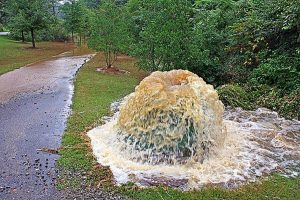A Spooky Situation

As fall approaches, we can look forward to the nights getting slightly cooler and an abundance of horror movie marathons. Maybe even a pumpkin spice beverage or two. As we prepare to dive into all things spooky these next two months, let us consider one of the scariest circumstances there is: a blocked sewer system. That means a high risk of wastewater overflow! Imagine everyone’s waste sneaking onto the street and into our local ecosystems. To avoid this terror, Sarasota County has put into effect an FOG Ordinance as of January 2020.
FOG, you ask?
Fats, Oils, and Grease (FOG) Ordinance
Well, every time we put Fats, Oils, or Grease (FOG) down our drains, we run the risk of clogging up our pipes. When these pipes are clogged, wastewater has nowhere to go and can end up causing overflow or damaging processing equipment. This can be quite expensive and damaging to the areas that are exposed to sewage. This blockage happens because compounds in the FOG category are a thicker density than that of water, and many become solid at cooler temperatures.
Similarly, when fats, oils, and grease come into contact with non-flushable items such as wipes and paper towels in wastewater, it can create large blockages known as fatbergs. Some of these fatbergs have created so much damage to pump stations that repairs have cost millions of dollars. Even though you may think “just a little oil down the drain won’t hurt anyone,” know that if everyone were to follow that mentality, we would be dealing with a proper fatberg invasion.
Be aware of what you’re pouring down your drain before it’s too late. See the list below for some common sources of fats, oils, and grease.

- Meats, food scraps, and baked goods
- Sauces, gravies, and salad dressings
- Dairy products (milk, cream, yogurt and cheese)
- Fats, lard, cooking oil, shortening, butter and margarine
For more information on the FOG Ordinance, visit the Sarasota County website.
Our sewer systems are connected, meaning that your actions at the sink can have an impact on your neighbors. Septic systems, while disconnected from central sewer services, can be equally as vulnerable to damage from FOG clogs. Start the conversation about FOGs in your community and try to practice the following disposal tips as often as possible.
Disposal Tips
So, now that we have a better idea of what to keep out of our drains, we can take the proper steps to protect our septic and sewer systems. Disposing of fats, oils, and grease may seem difficult at first glance, but it’s actually fairly easy. First, identify what kind of FOG you are handling.

If you have a substantial amount of grease or fat from frying something or cooking a large, meat-based meal…simply pour the substance into a freezable container. Once the fat is frozen solid, it is much easier to put in the trash. Feeling like reusing your fat? Try making your own suet cakes for birds in your backyard. Find a recipe here.
You can use a similar method when dealing with sauces, gravies, and salad dressings. Just add the relevant compound to the right container, freeze until solid, and throw out. Small amounts of each can also be added directly to the trash without any problem.
Spoiled milk? Liquid dairy products can also be frozen before being thrown away. Just be sure to wait until right before your trash collection service to reduce the chance of liquid leaks in your trash bag. Another option is to use a bag of kitty litter to absorb any liquid before it gets thrown in the trash. Alternative milks such as soy and almond milk may be composted, but avoid using those that are high in fat. Cheese, yogurt, sour cream, and other solids should not be composted and instead thrown away.
If you have just a small amount of grease, oil, or fat in your pan from cooking, you can wipe it down with paper towels before cleaning it in the sink. Simply dispose of the paper towels in your trashcan.
Keep in mind that many oils and fats can be reused for cooking. In fact, many meat-based fats can add an extra layer of flavor to your dishes. Oil production can be a long, laborious process, and it is always better to reuse when possible.

By keeping these fats, oils, and grease out of your drain, you are helping the effort to keep Sarasota County’s pipes running smoothly. Remember: no FOG, no clog! If you would like to learn more about keeping your septic system in top shape, check out this resource from the Environmental Protection Agency. Those connected to Sarasota County’s central sewer system can learn more about maintenance and upkeep here.
Hungry for more? Check out the following resources…
- Avoid Unnecessary Sewer Expenses: Keep the Wipes out of the Pipes
- How to Keep Your Septic System Healthy
- Septic Systems
 1
1
